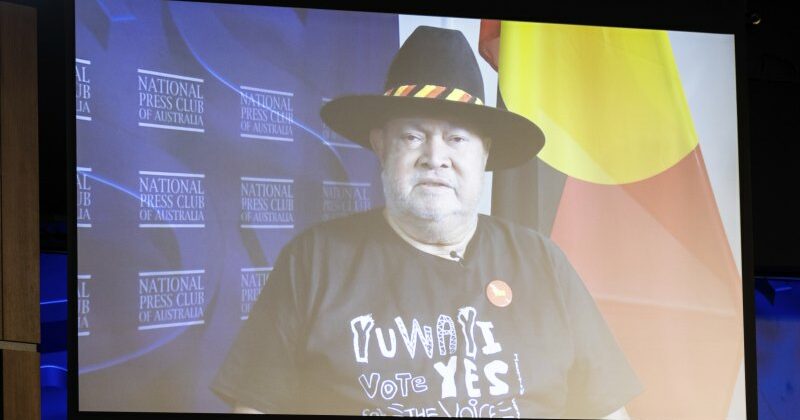Save articles for later
Add articles to your saved list and come back to them any time.
Australians are being urged to ignore the opinion polls and cast a Yes vote on the Voice to ensure young Indigenous people gain hope for the future, with federal minister Pat Dodson warning that a No vote would offer nothing to the next generation.
Dodson, often called the “father of reconciliation” over decades of work, stepped up the case for change by saying a positive vote for the Voice would bring the country together and allow all young Australians to move on from the legacy of conflict over Indigenous rights.
Countering claims the Voice would cement privilege for First Australians, he cited high suicide rates among young Indigenous people as well as the removal of children from families as proof that a new approach was needed to consult on policy.
Senator Patrick Dodson, Special Envoy for Reconciliation and the Implementation of the Uluru Statement from the Heart, during an address to the National Press Club of Australia via videolink from Broome, in Canberra on Wednesday 11 October 2023. Credit: Alex Ellinghausen
“There’s absolutely nothing scary about that – there’s nothing to be fearful of,” he told the National Press Club.
“So if you’re confused, look in the mirror and say ‘is that a good thing to do?’ What’s the alternative? There’s no alternative, except more of the same, picking up the crumbs that fall from the table.”
While the No campaign says the Voice would divide Australians by race, Dodson described the change as a way to give Indigenous people a “seat at the table” so they were consulted on policies that affected them.
But he also presented the vote as a fundamental decision on the nation’s future because of the danger of a No vote to reconciliation, saying Australia would have to “look in the mirror” after votes are counted on October 14 to consider what Australia stands for.
“There’s only good to come out of this. There’s a vision to come out of this and there’s hope to come out of this,” he said.
“So the truth of our integrity as a nation is what’s at stake here – the truth. And we will need to face up to that on the 15th of October, once we know what the outcome is.
“I’m confident that we are able to get sufficient votes and a sufficient number of the states to get us across the line.
“I don’t believe in the polls. I was in the opposition when Bill Shorten was the leader and we thought we were going to win government, and of course we got the biggest hiding possible.
“So polls tell you lies, and don’t believe them. If you’re fearful about the confusion, vote Yes. Don’t vote No, because No takes you nowhere.”
Dodson, a Catholic priest since 1975, a royal commissioner into Aboriginal deaths in custody in 1989 and the chair of the Council for Aboriginal Reconciliation from 1991 to 1997, addressed the National Press Club on Wednesday from the Western Australian town of Broome after recent treatment for cancer.
Asked how he would react to the success or failure of the Voice on Saturday night, Dodson said a Yes vote would be a source of pride because it would mean Australians had recognised the first people of the country, while a No vote would require a rethink on the nation’s view of itself.
“If we say No, then obviously that’s going to be a matter for us to reflect upon. We’re going to have to look in the mirror and say: ‘Who the hell are we? What have we done? And what are we going to do about it?’
“It’s not just a question for the government, it’s a question for the Australian people.
“The challenge will be for us to try and develop what the South Africans did when they got rid of the apartheid regime. They had to develop these dialogues and scenario planning processes, they developed the Truth and Reconciliation Commission in order for that country to try and heal from the apartheid policy.”
The South African commission heard testimony about the past as a way to heal the country after Nelson Mandela became president, with leaders such as Archbishop Desmond Tutu saying it could be a model for Australia.
When Dodson was asked if the government would have to consider a similar commission if the referendum rejected the Voice, he said a “truth-telling” process was part of the Uluru Statement from the Heart and the government had committed to implementing it.
“The government is committed to implementing the Uluru statement in full, which involves truth-telling and agreement-making, treaty-making, so we’re going to have to consider that as a government.”
Cut through the noise of federal politics with news, views and expert analysis. Subscribers can sign up to our weekly Inside Politics newsletter.
Most Viewed in Politics
From our partners
Source: Read Full Article

